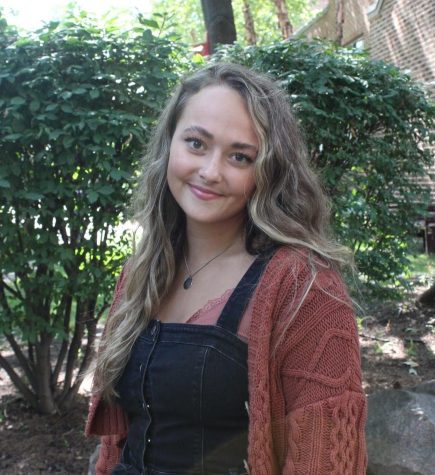Satirical play unleashed at the Schuster
“Dog, Woman, Man” wraps up at Gannon’s theatre
“Dog, Woman, Man,” featured Jack O’Connell (front), Grace Dible (middle) and Marino Martin, respectively.
December 14, 2021
The Sibylle Berg play “Dog, Woman, Man” rounded out a semester chock-full of activity at the Schuster Theatre.
As the title of the show suggests, this production had three characters, “dog,” “woman” and “man,” which were intended to be rotated among six members of the theatre. However, this did not play out as planned, as the cast member set to play woman Saturday afternoon experienced an emergency. Grace Dible, a sophomore theatre and communications major, took her place last minute, requiring her to read her lines on book, as the signs posted in the lobby cautioned, according to director Alaina Manchester.
As far as the other roles for the matinee showing Saturday, “man” was played by Marino Martin and “dog” was played by Jack O’Connell.
The “dog” character was the narrator of the show, as his job was to follow complicated twists and turns of the relationship between “woman” and “man,” which may seem all too familiar to many play-goers who are dating in today’s society.
The play opens with the woman, who is depressed and hopeless as she faces the dead ends of her love life. This, perhaps, gives viewers some foreshadowing to what the “man” may play for her character in the production.
After giving love one more chance, the woman decides to go on a wine-date with the man, and on their way back to her place, they meet the dog for the first time, inviting him through the fourth wall and into the story as more than just a narrator, but also an element of the story.
Like most first dates gone too far, this one didn’t end well or meet “woman’s” expectations, as she asked the man to leave after he was insensitive during intimacy.
Falling into the clueless-male stereotype, “man” was confused as to what he did wrong, and after some consideration and reflection, he brought “woman” apology flowers and dog some food, again including him more in-depth in the story.
Without giving away the ending, it takes an unusual turn for all of the characters, bringing up theories and conversation about co-dependency and the depression that comes with caring for someone so deeply that you neglect your own identity.
Was the woman better off alone? Maybe.
Was this just a simple show with simple satire? I doubt it.
I believe that the German writers of this play intended to create a deeper conversation about relationships for those who dare to pay close enough attention to go looking for it.
Chaos unfolded at the end of the play, ending in death and uncertainty, which was much different than the glimmer of hope that the beginning of the play invited as the audience rooted for the woman.
This leaves puzzled play-watchers with the question of “what was the point?”
And that is for you to decide.
Stay tuned for more coming up from the Schuster Theatre.
ALI SMITH





